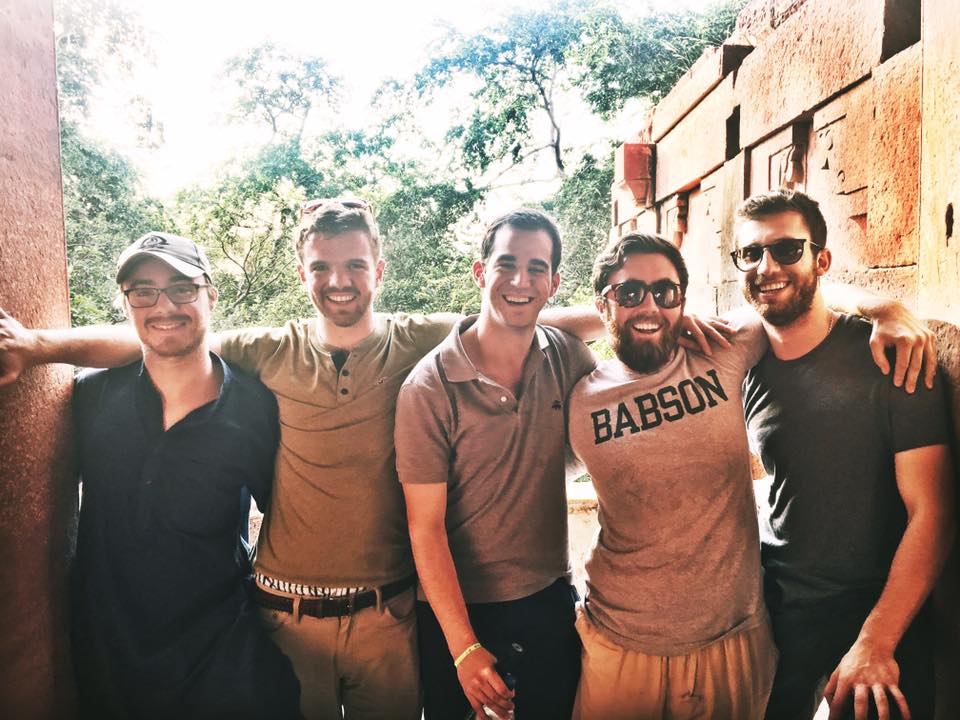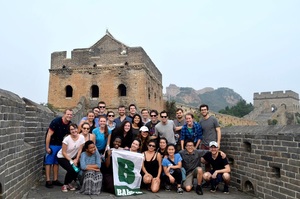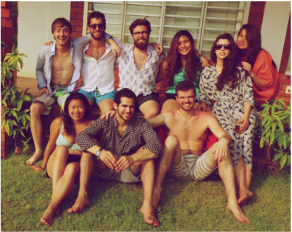Only Time Will Tell
Have you heard that saying that says: “You only realize how much something means to you once you don’t have it anymore”? I have heard it too. It is weird to think that BRIC has ended just a week ago and I am already having some nostalgic thoughts about it.
BRIC is not a conventional semester abroad. Not even close. Fours Professors travelled from Boston just to teach us the classes and coordinate the course. Classes would not be constrained to classrooms; we would have company visits, historical site visits, and more. We would meet students in each place we would go. We would learn about the culture and the business practices of every country we visited. And we would behave like locals in Russia, China, and India.
But I am not kidding when I say that the most influential source of knowledge I got was from the cohort itself. The people I met, the people I lived with for the past three months, were the ones who taught me the most during this experience. It’s crazy for me to think that was true, especially knowing that I was the oldest of the group and that I did not know most (if not all) of them before the program began.
They had an easiness to engage in deep conversations with me, anywhere at any time (and I love that!). We would take a concept or learning from class and discuss how could we improve it in real life (take social justice in India for example). Or we would just wonder about our future plans and dreams. We would talk as if we would have the necessary power to make the world a better place (and then we would question what “better” means). I would learn from the questions they would make, the answers, or just the way they would talk. Anyways, I realized how smart and capable these guys were, and I felt very privileged to be part of that group.
BRIC is not a conventional semester abroad. Not even close. Fours Professors travelled from Boston just to teach us the classes and coordinate the course. Classes would not be constrained to classrooms; we would have company visits, historical site visits, and more. We would meet students in each place we would go. We would learn about the culture and the business practices of every country we visited. And we would behave like locals in Russia, China, and India.
But I am not kidding when I say that the most influential source of knowledge I got was from the cohort itself. The people I met, the people I lived with for the past three months, were the ones who taught me the most during this experience. It’s crazy for me to think that was true, especially knowing that I was the oldest of the group and that I did not know most (if not all) of them before the program began.
They had an easiness to engage in deep conversations with me, anywhere at any time (and I love that!). We would take a concept or learning from class and discuss how could we improve it in real life (take social justice in India for example). Or we would just wonder about our future plans and dreams. We would talk as if we would have the necessary power to make the world a better place (and then we would question what “better” means). I would learn from the questions they would make, the answers, or just the way they would talk. Anyways, I realized how smart and capable these guys were, and I felt very privileged to be part of that group.
When I think of a way of explaining what BRIC is or what it meant to me, it becomes a hard task. But what I have sort-of clear is the following three thoughts that have stuck up with me from the conversations I had with my friends throughout the past three months:
Let’s Explore the World
It is sometimes frightening to realize how little we know about life. Or at least that was my case. We began eating with forks and knives in Russia, and then we moved to chopsticks in China and ended up eating with our hands in India. What you consider to be rude in Russia is the rule of law in India. And so on. I felt as if I had lived in a bubble all my life (even though I am well-travelled). Being able to really understand and somehow immerse myself in different cultures taught me that there is so much more in the human experience that we can learn from, than why not?
I once heard someone say “There are two types of people in the world: those who say that there are two types of people in the world, and those who don’t”.
That tricky quote stayed with me. I want to say that I believe in that, but I know that by agreeing to it I am being guilty of making such binary division. Anyways, I have realized that there is so much richness and uniqueness in people that dividing us in just two big groups might be a big mistake.
I have met amazing people in the streets, taxi drivers, students, people at parties, at restaurants, almost everywhere! They taught me so much about their culture, about the way they see the world. That definitely impacted how I see my world now. I want to keep exploring. I want to keep growing.
It’s not Enough with Knowing that You Are Privileged
If you are able to read this from a computer, laptop, smartphone or any other device that has access to internet, you can consider yourself very privileged. I think I did not realized how privileged I was until being in BRIC. I have traveled a lot in my life, I come from a developing country, and yet, I never truly internalized how privileged I was. This thought came to our conversation especially as we were in India, when we saw the results of poverty and social injustice. Having access to education, healthcare, water, energy, clean air, internet, and a loving-family, is a privilege that few people in this world currently have. Think about it.
But being aware of my privilege was just the first step. When you are privileged you have three options: ignore it, be aware of it and do nothing about it, or be aware of it and do something about it. I opt for the last one.
It is not enough for me anymore to be aware of my privilege. I feel a responsibility, a good responsibility. How can I best use this power to make the world a better place? Is that a very romantic an idealistic question to ask? I don’t think so.
“Life is Short” Says Who
Usually, people who say that life is short are the ones who have many plans in mind. Plans that will only affect them, plans that will affect millions of others, good plans, bad plans. But what I think all of these people have in common is the idea (or misconception) that they will not have enough time to achieve everything they want to do in their lives.
I have been thinking a lot about that. Because when you do something that you truly enjoy time flies. But if you want to feel like time is going slow, do something boring. Shouldn’t it work in opposite ways?
What I want to live by is not by the amount of things I do or accomplish in this short life. But about the positive impact those things create in the world. As I said in the previous point, I have a privilege, we have a huge privilege, so let’s do something positive with it. Let’s do something transcendental that will eventually last longer than our biological-clock, something that will extend our presence in the world. “Life is short” Says who?
---
Maybe I am dreaming too much. Maybe I am thinking too big here. Maybe the BRIC experience and the conversations with my friends made me think that the sky is the limit. Maybe.
Or maybe not.
Only time will tell. But I hope that I don’t stop exploring the world, using my privileges for the betterment of the society, and being aware that my life is short but hopefully what I leave behind ends up lasting forever.



